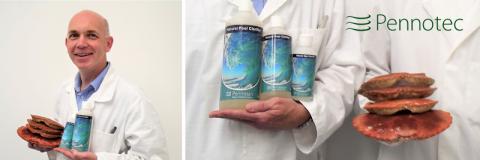Pennotec, a technology firm based in Y Ffôr near Pwllheli in Gwynedd, Wales, is entering the next stage of development for a new product turning waste shells from seafood processing into a swimming pool cleaner.
The Welsh firm, supported by the Business Wales Accelerated Growth Programme (AGP), which assists companies with business growth, training and investment, works on finding new ways to turn industrial food waste into everyday products and reduce the amount of waste going to landfill. The company identifies and extracts materials that may previously have been classed as waste by food industries, such as apple cores and crustacean shells, and reuses them in other products.
Waste in food production, while far smaller than that generated by households, is significant, with 3.6 million tonnes of food surplus and waste generated by UK farms in 2017. Actions by companies such as Pennotec redirect this waste into resources for manufacturing and innovative production. Pennotec has developed a form of biotechnology that gently decomposes food waste using fermentation and natural enzymes in a way that preserves the valuable products in the by-product streams.
Previously focusing on research and development, Pennotec is now working with Welsh universities and is entering into the next stage of development of a natural water clarifier – essentially a water cleaning agent – extracted from waste shells from seafood processing for use in filter systems for swimming pools and hydrotherapy.
Owner and Managing Director of Pennotec, Dr Jonathan Hughes, states how his company’s approach to deriving value from food waste is different from other commercial methods, such as biogas production from anaerobic digestion, in that it is able to extract specific valuable products.
He said: “We have begun manufacturing and selling natural water purification products derived from crustacean (crab and prawn) shells. We have several similar products in the pipeline, chief amongst them are fat-mimicking functional fibres from fruits and vegetables – particularly surplus, out-graded apples and pomace from juice and cider manufacture. The established commercial technology for obtaining value from food waste is biogas production. This decomposes everything – both valuable materials and low value fats – to carbon dioxide, methane, water and heat. By extracting the valuable products first, we can use waste more sustainably."
David Notley of the Exelerator Consortium, which delivers the Welsh Government’s AGP, said: “Pennotec is another exciting and innovative Welsh company which is capitalising on the global need to create new products from sustainable sources. It is coming into a market in its infancy, but one where we need firms in Wales to have a presence as we future-proof our economy.”
The Welsh Government has been at the forefront of circular economy thinking in the UK, investing millions of pounds in boosting the country’s recycling rates – it boasts the best recycling rate out of the four nations of the UK – and circular opportunities for businesses, exemplified by injections of funding such as the £6.5 million set aside in April 2019 to help businesses move towards a focus on secondary recycled materials and reduce the reliance on raw materials.
Learn more about Pennotec.
You can find further information on Business Wales Accelerated Growth Programme (AGP)

